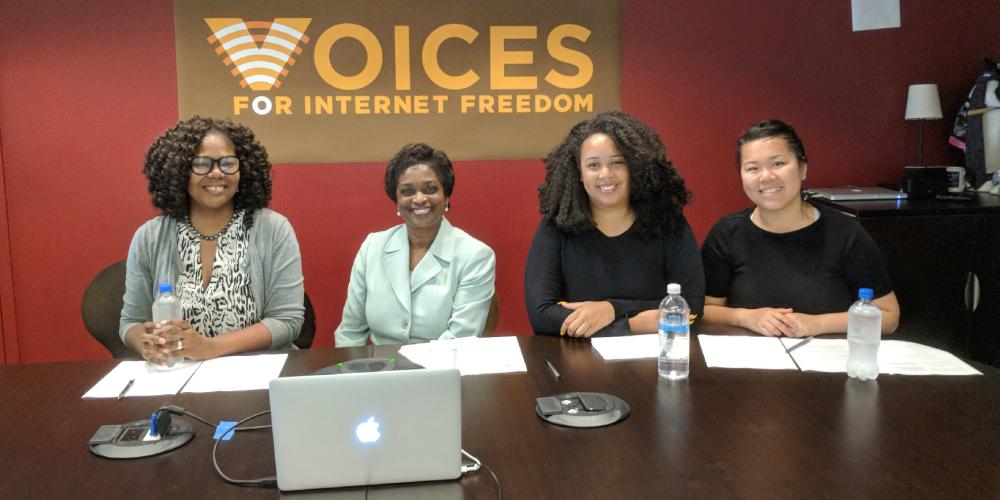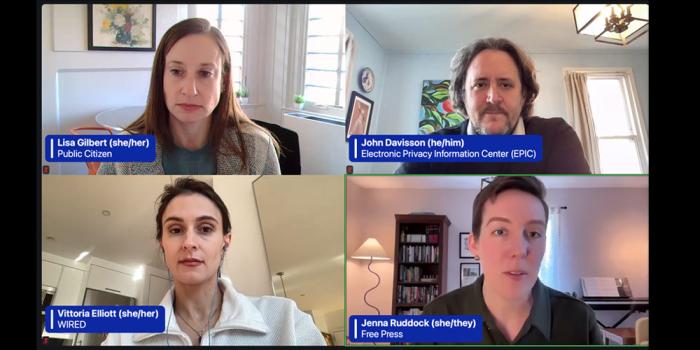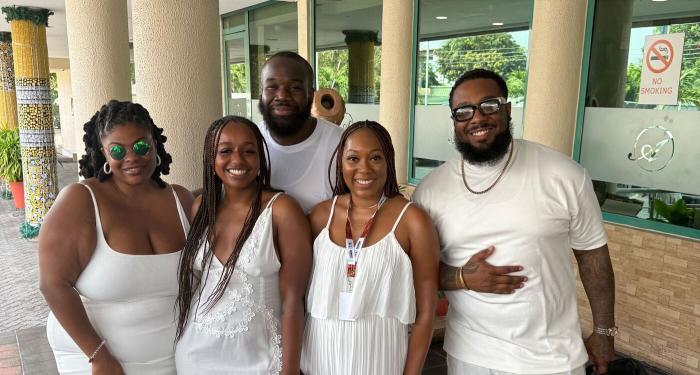Thank You Clyburn: Honoring the 'Conscience' of the FCC

“She’s led with integrity, courage, love and wisdom.”
As Tuesday’s #ThankYouClyburn webinar conversation began, one thing was immediately clear: There’s genuine mutual admiration between FCC Commissioner Mignon Clyburn — whose nine-year tenure at the agency is coming to an end — and activists from the Voices for Internet Freedom coalition.
The admiration is based on a shared belief in the inherent dignity of all our communities — a belief rooted in the lived experience of being people of color in the United States.
How often can activists point to this kind of connection with a veteran politico — a presidential appointee no less?
Rarely, if ever.
But this wasn’t an exclusive insider conversation. It wasn’t a conversation about people of color — it was a conversation among people of color. And with that came a realness and intimacy that’s rare in policy discussions.
Fighting for digital civil rights
The scene: Clyburn, seated in the D.C. office of Free Press and surrounded by multigenerational representatives from each of the Voices for Internet Freedom organizations.
The panel included Brandi Collins-Dexter of Color Of Change, Laura Li of 18 Million Rising, Carmen Scurato of the National Hispanic Media Coalition, Erin Shields of the Center for Media Justice and Joseph Torres of Free Press. Additional panelists joined online in a discussion viewed by hundreds of virtual attendees.
Clyburn had recently announced her imminent departure from the Commission after nine years of service. Accordingly, the environment was at times emotional, nostalgic and defiant — yet always circling back to the realities people of color face when we fight to protect our voices.
Carmen Scurato provided a sobering outline: The digital divide continues to disproportionately impact people of color of all income levels. We don’t have access in our homes, which impacts our ability to get jobs, access health care and access education.
For children, this divide creates a huge barrier because they can’t complete schoolwork at home.
Broadband access is access to opportunity.
Scurato also shared the critical importance of the Lifeline program, which subsidizes phone and internet access for poor families and is currently in danger of being dismantled thanks to FCC Chairman Ajit Pai. The proposed changes would hurt a huge percentage of people on the island of Puerto Rico, people who are already struggling to recover from the devastating impact of two major hurricanes last year.
Access can make a life-or-death difference.
Erin Shields, an activist who has organized extensively for Black lives and media justice, shared how internet freedom has made liberation movements possible — because there’s a low barrier to entry for making your voice heard and telling your story.
Laura Li noted that most Asian Americans and Pacific Islanders are spread across the United States and depend on the open internet and Net Neutrality to stay connected to family. If it weren’t for platforms like YouTube, Li said, Asian Americans wouldn’t have the voice they have now.
Shifting gears, moderator Steven Renderos asked about the significance of the 50th anniversary of the landmark Kerner Commission Report, which showed how racist practices in the U.S. media contributed to national unrest during the 1960s.
Clyburn shared that White men own nearly all of our media — which was also the case during the time of the Kerner report. The lack of diverse ownership causes a ripple effect on who’s hired, what’s covered, who’s covered and how they’re covered.
With almost three out of four U.S. adults (71 percent) watching local television news and 65 percent viewing network newscasts over the course of a month, it’s easy to see a correlation between the lack of diversity and the rampant dehumanization and silencing of communities of color.
Without Net Neutrality, we’re doomed to see new and emerging platforms take on all the worst aspects of legacy media.
Continuing on the topic of media ownership and monopoly, Clyburn emphasized that individuals aren’t buying contemporary news organizations. Instead, large groups are buying up other large groups, swallowing up local voices for the sake of profit.
Clyburn revealed that the activism of Voices groups has often provided a “baseline” for what was important in her work at the FCC. She chose to intentionally engage with these groups because she knew that organizations led by people of color often don’t have the resources and access that others do as they engage in advocacy work.
Celebrating Clyburn’s legacy
As the discussion shifted to tributes to Clyburn’s tenure, this deeply personal approach became a recurring theme.
Center for Media Justice Organizing Director Steven Renderos, joining via web, shared an update on a young woman who was involved in Clyburn’s legendary fight to cap exceedingly high phone rates for prisoners and their loved ones. Previously the child of an incarcerated parent, the woman recently graduated from high school.
“Thank you for sharing that. You have really made my day,” said Clyburn.
Clyburn revealed a special connection to Free Press Deputy Director and Senior Counsel Jessica González: “When we were fighting for prison-phone justice, you turned to me one day and said ‘We need you to be our champion.’ And that was when I knew I had to take on that fight.”
As the webinar approached its conclusion, Clyburn reflected at length on her South Carolina upbringing. She recalled her parents teaching her that “if you see something wrong, you need to do something about it. If you can’t do it, find others and work together to do something about it.
“It is who I am.”
The commissioner spoke about her continued commitment — seeing her imminent departure from the agency not as a loss, but an opportunity to become an advocate beyond the confines of the FCC.
Commissioner Clyburn’s work is only beginning. Her trademark spark will continue to blaze beyond her FCC tenure — and was on full display when trolls attempted to dampen spirits in the webinar’s live online chat.
“Hear this,” she said. “You will not win, you will not succeed. We will be victorious.”
If we continue to have leaders like Mignon Clyburn, victory and justice are indeed within our grasp. We deeply appreciate all she stands for and all she has given, and we represent all of our communities when we say: #ThankYouClyburn.




